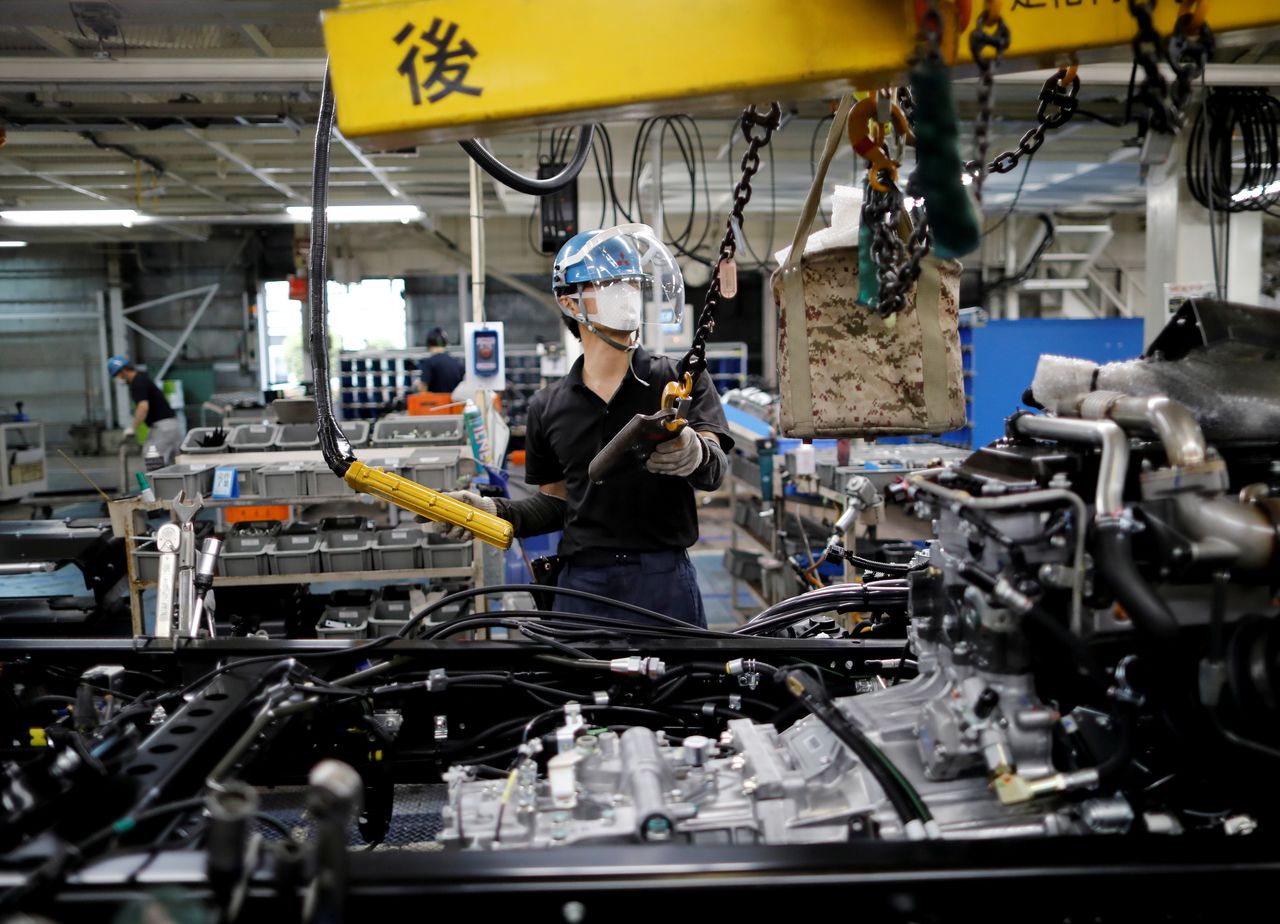Japan's capital spending extends declines as firms tighten purse strings
Newsfrom Japan
- English
- 日本語
- 简体字
- 繁體字
- Français
- Español
- العربية
- Русский

FILE PHOTO: An employee wearing a protective face mask and face guard works on the automobile assembly line at Kawasaki factory of Mitsubishi Fuso Truck and Bus Corp, owned by Germany-based Daimler AG, in Kawasaki, south of Tokyo, Japan May 18, 2020. REUTERS/Issei Kato/File Photo
By Daniel Leussink
TOKYO (Reuters) - Japanese companies cut spending on plant and equipment for the fourth straight quarter in January-March, as the economy struggles to shake off the drag from the coronavirus pandemic.
Weak business spending is likely to worry policymakers hoping strong domestic demand can help make the country's economic recovery more sustainable.
Ministry of Finance (MOF) data out on Tuesday showed capital expenditure in the first quarter fell 7.8% from the same period last year, pulled down by weaker investments in transportation equipment, electrical machinery and real estate.
It marked the fourth consecutive quarter of annual decline in capital expenditure, after a 4.8% contraction the final quarter of last year.
"The figure gives a weak impression, but GDP was originally weak already," said Hiroshi Miyazaki, senior economist at Mitsubishi UFJ Morgan Stanley Securities.
A separate, private-sector survey on Tuesday showed Japan's factory activity expanded in May, largely thanks to strong external demand, but at a slower pace.
The world's third-largest economy slumped back into decline in the first quarter as a slow vaccine rollout and repeated emergency curbs to halt a resurgence of infections hurt domestic demand.
The finance ministry's capex data, which will be used to update gross domestic product (GDP) figures for the first quarter due out June 8, was unlikely to impact the growth estimate in a major way, analysts said.
Some firms were seen putting off unnecessary investments in favour of holding onto cash, a finance ministry official said.
"Non-manufacturers have likely been building up cash positions rather than committing to spending for reinforcing safety, pushing back their capital expenditure plans beyond the fiscal year-end," said Takeshi Minami, chief economist at Norinchukin Research Institute.
RECOVERY SLOWING
After bouncing from last year's slump, driven by a strong export recovery, some analysts worry Japan's economy could slip back into recession in the current quarter due to extended coronavirus curbs.
A preliminary estimate found Japan's economy shrank an annualised 5.1% in the first quarter as households curtailed spending and export growth slowed sharply.
The latest MOF survey showed manufacturers' business spending fell 6.4% from a year earlier, posting a smaller contraction than the previous quarter's 8.5% drop.
That of service-sector firms dropped 8.5% year-on-year, up from a 2.6% decline in the previous quarter.
Weaker-than-expected factory output and retail sales figures on Monday showed that the economic recovery remained dependent on overseas demand.
Capital expenditure lost 0.4% in January-March from the previous quarter on a seasonally-adjusted basis, the MOF data showed.
Corporate recurring profits gained 26.0% in January-March from a year earlier, up for the first time in eight quarters, while sales were down for a seventh consecutive quarter, declining 3.0%.
(Reporting by Daniel Leussink; Editing by Sam Holmes)
(c) Copyright Thomson Reuters 2021. Click For Restrictions -
https://agency.reuters.com/en/copyright.html